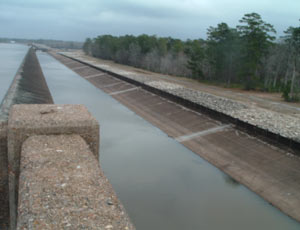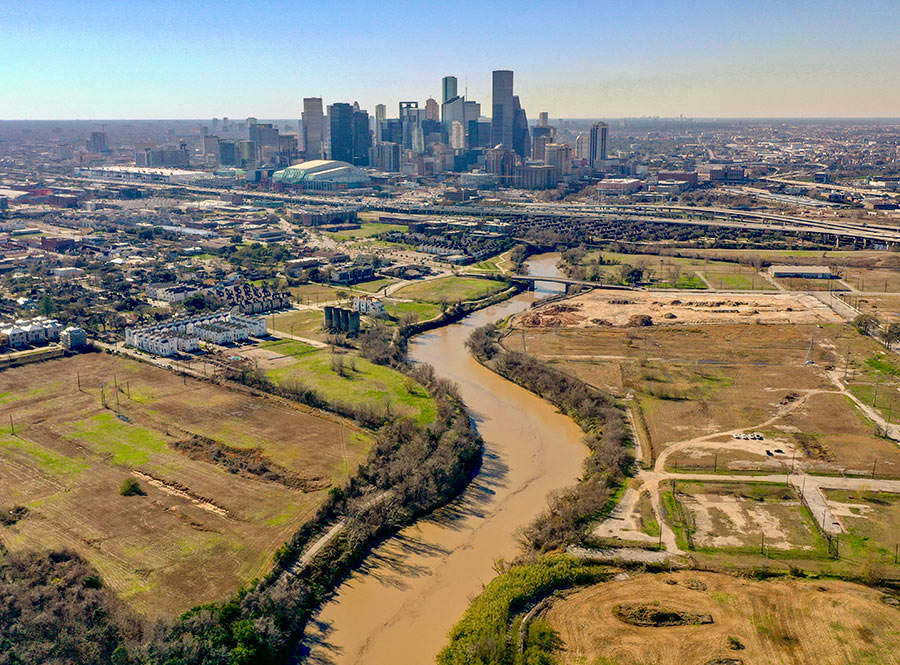THE LATEST PIECE OF THE HOW-TO-STOP-HOUSTON-FROM-SINKING PUZZLE  Work is underway on a large pump station to help send water from the Trinity River down to Lake Houston by way of a 26.5-mile-long series of pipes and canal from northeast of Dayton, TX, roughly following the southwesterly trace of Luce Bayou. Dylan Baddour writes in the Chronicle this week that the goal of the transfer project is to beef up the Houston region’s surface water supply; that’s partially in response to longterm cutbacks around town on groundwater pumping, which Harris, Galveston, and some other nearby counties have gradually shied away from in the wake of the creeping post-WW2 realization that pulling up groundwater unchecked was causing the area to sink. To the northwest, Baddour writes that folks have also been running into salt and sulfur in deeper wells, drilled as shallower water wells have started to run dry. Engineer Michael Bloom tells Baddour that the full series of structures and upgrades, which also includes a massive expansion of the water treatment plant near Lake Houston, is currently the largest water project in the country. [Houston Chronicle; previously on Swamplot] Photo of existing canal near Lake Houston: Coastal Water Authority
Work is underway on a large pump station to help send water from the Trinity River down to Lake Houston by way of a 26.5-mile-long series of pipes and canal from northeast of Dayton, TX, roughly following the southwesterly trace of Luce Bayou. Dylan Baddour writes in the Chronicle this week that the goal of the transfer project is to beef up the Houston region’s surface water supply; that’s partially in response to longterm cutbacks around town on groundwater pumping, which Harris, Galveston, and some other nearby counties have gradually shied away from in the wake of the creeping post-WW2 realization that pulling up groundwater unchecked was causing the area to sink. To the northwest, Baddour writes that folks have also been running into salt and sulfur in deeper wells, drilled as shallower water wells have started to run dry. Engineer Michael Bloom tells Baddour that the full series of structures and upgrades, which also includes a massive expansion of the water treatment plant near Lake Houston, is currently the largest water project in the country. [Houston Chronicle; previously on Swamplot] Photo of existing canal near Lake Houston: Coastal Water Authority





meanwhile we allow billions of gallons of water to flow right thru the city in our bayous and creeks without touching a single drop. Maybe I’m from a different planet but logic would seem to be on the side of build diversion canals, large cisterns, convert retention ponds into actually small lakes and ponds and adding treatment plants and BAM! . Surface water solved, flooding solved, drought prevention solved, aquatic recreation solved and property values going up in what once was a flood plane. But no lets go 50 miles away, tap an already existing supply, build 30 miles of canals and pipelines and still not solve our water problems. I mean how can you solve water problems but not acquire new sources? Who are these highly trained and educated people? New Yorkers?
@simplysid: The article says “… daily pumpage at times exceeded 450 million gallons”. Back of the napkin math says Lake Houston could hold 117 days of water at that rate. Just where are you going to put these cisterns?
Wasn’t there something on Vox today about cost of water around the US? Houston was pretty much the cheapest I saw around the entire country so we’re actually quite well off compared to most all metropolitan areas; both infrastructure and fiscally apparently.
.
I like your brainstorming sid, but I’d like to think of it as the opposite. “lets go 50 miles away, tap an already existing supply, build 30 miles of canals and pipeline” actually sounds like a marvelous engineering efficiency that we’re lucky to be able to tap rather than a lack of foresight.
@simplysid – Do you really want to drink Houston roadway run-off?
correct El Debtor, the water in the bayous is too contaminated to purify for drinking. The Luce Bayou project has been studied and designed for the last 20 years at least, they have put a lot of thought into it. It isnt some crazy idea they came up with over night.
As for the cisterns, if CoH would make raise the price of water to something more than $28 for 10,000 gallons maybe more people would be interested in rain water catchment systems for watering their lawn etc.
We should be proud that Houston recycles DFW’s effluent. Very green of us.
Singapore recycles most of their sewage into potable drinking water by advanced treatment such as reverse osmosis. Surely Houston roadway runoff can be treated
Really? With the TONS of chemical run off ( in the watershed) PLUS the TONS of airborne chemicals that are added -during rainstorms- to the already overly chemical-ized “water” , I wouldn’t give Houston water to my plants or pets. Houston’s drinking water (from Lake Houston ) has some of the highest levels of septic tank / agricultural runoff / algae ,etc already in it.Then the CofH “treats” the water with chlorine and fluoride -two MORE carcinogen causing chemicals and people drink the nasty tasting crud. Plus it’s very hard,minerally H2O) to begin with. It strips your hair of the natural oils ( you know you have to add MORE chemicals aka conditioners to alleviate that issue / then the water strips and dries your skin .. No wonder Houston has some of the highest cancer rates / cases of skin problems ,et al. And ever notice the brown tips of plants watered with CoH H2O? That’s chemical burns. Think what it does to YOUR insides /organs /bodies. Not healthy at all. Where as Austin and San Antonio have soft water with way less chemicals. All municipal water sources , per EPA , law have to add chlorine and fluoride to “treat” the water.But those chemicals are POISONS and CARCINOGENS !!!!! Remember that the next time you drink our crappy tasting H2O and / or bathe-shower-soak in the stuff. Or put in your pet’s bowls and /or water your lawn /greenery.. Partial Source: lawsuit depositions per an EPA Superfund Toxic Dumpsite case I litigated here in the Houston area in the late 1980’s. It was eye opening , shocking,disgusting and vile to find all of that out. As perpetrated by the international petro-chemical industries along the Houston Ship Channel. It was also : horrifying,sickening, disheartening, totally offensive,anger inducing and revolting. Thankfully the Federal judge fined the companies BILLIONS & ordered then to do full scale abatement . It took years – the G** Damn companies stalled and delayed.Only pissed off the judge even more – he increased the financial and legal penalties by treble damages.. It was awesome. Didn’t bring relief to the suffering victims or their surviving loved ones,their lives were ruined. I took solace in their own self created karma coming into the lives of the executives who only cared about the companies profits and their stock profits.. Greedy ,soul less evil bastards and that the Universe dumped some of the suffering upon the executives as was dumped into innocent victim’s loves…
@ Local Planner: the only municipalities not recycling somebody else’s effluent are those sitting on the continental divide.
QUIT building and pouring concrete. The H2O can’t drain like it did 5-10 years ago. Yet our “leaders: have their heads so far up the developers butts they can see eye to eye !!!
I’m not really clear why simplysid or HappyGoLucky are bringing up flood control issues. This project is only peripherally related to that issue and is irrelevant for all intents and purposes.
Also, HoustonReader, a continental divide is not the only origin point of all streams. The top of any watershed would do and there are lots and lots and lots of those, all around, even in the Houston region. The thing is, there’s not typically a lot of flow at the headwaters of a stream; and impoundments may work, but around here the basins probably aren’t very deep. That usually leaves only larger rivers and their exaggerated effects on surrounding topography as very good candidates. There are some exceptions, though. The proposed Allens Creek Reservoir would be one of them.
@ Niche: your comment about watersheds is accurate, but you’re missing the point: we cannot all rely on water that hasn’t passed through other municipality.
.
Regarding the connection between this project and flooding, consider the history of the Brownwood neighborhood in Baytown and the phenomenon of subsidence.
After last nights watergate was on internet again and checked the water graph. I was wrong and Houston is one of the most expensive cities for water rates. I imagine that goes back to us not being able to simply pump water from underground without causing serious issue.
.
However, we were still only half that of cities like Atlanta & Seattle that are approaching crises levels so some reference points are needed.
This project and the water plant expansion support the Surface Water Supply Project (West Harris County Regional Water Authority and North Fort Bend Water Authority). This 8′ diameter, 39 mile water line will move water from Lake Houston, ending around I10 and the Grand Parkway. The Luce Bayou project and other City-led improvements will offset this additional demand.